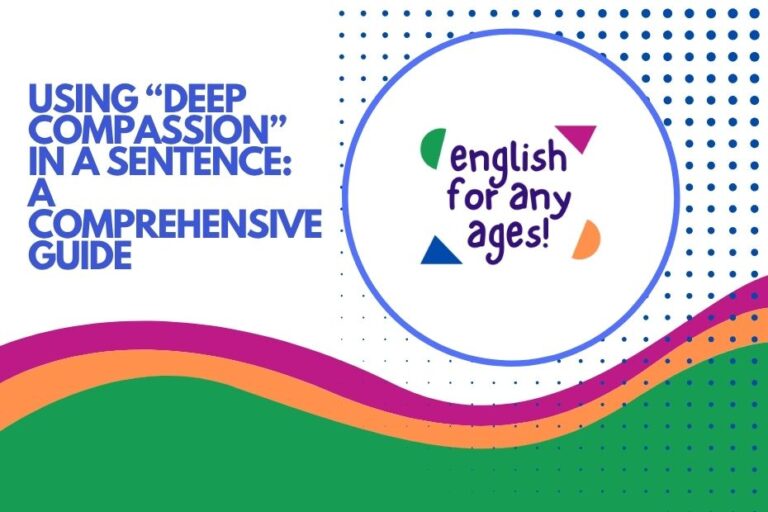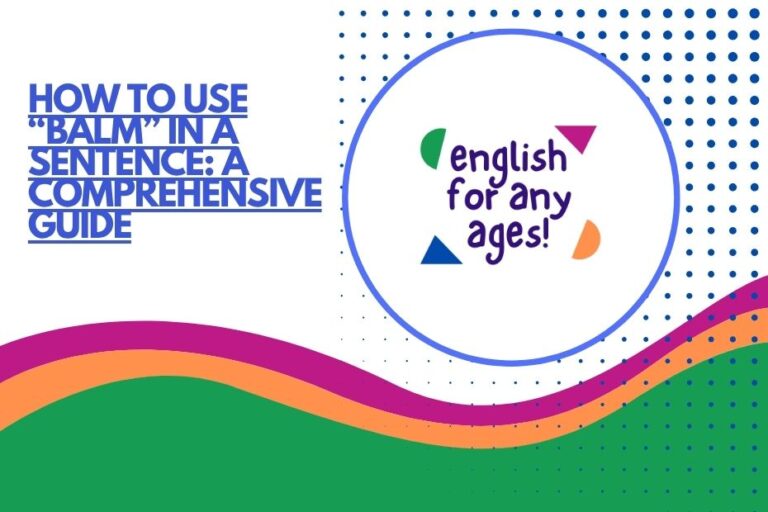Mastering “Out”: Sentence Examples and Usage Guide
The preposition “out” is a versatile word in the English language, serving various functions to indicate direction, location, or state. Understanding its nuances is crucial for both native speakers and English language learners aiming for fluency and accuracy.
This article provides a comprehensive guide to using “out” in sentences, covering its definitions, structural patterns, usage rules, common mistakes, and advanced applications. Whether you’re a beginner or an advanced learner, this guide will equip you with the knowledge and practice necessary to master the preposition “out.”
Table of Contents
- Definition of “Out”
- Structural Breakdown
- Types and Categories of “Out”
- Examples of “Out” in Sentences
- Usage Rules for “Out”
- Common Mistakes with “Out”
- Practice Exercises
- Advanced Topics
- Frequently Asked Questions
- Conclusion
Definition of “Out”
The word “out” is a highly versatile term in English, functioning as a preposition, adverb, noun, verb, and adjective. Its core meaning generally involves movement away from a specific location or state, or a condition of no longer being included or involved.
Understanding its different roles is essential to using it correctly.
As a preposition, “out” indicates movement or direction away from a place or position. It often implies a departure or exclusion. For example, “She walked out of the room” shows movement from inside to outside the room.
As an adverb, “out” modifies a verb, adjective, or another adverb, indicating a direction away from the inside or a state of being revealed or known. For example, “The sun came out” describes the sun emerging and becoming visible.
As a noun, “out” refers to a way of escaping a difficult situation or a player being dismissed in sports. For example, “He looked for an out from his financial troubles.”
As a verb, “out” means to reveal something that was previously hidden, especially someone’s sexual orientation. For example, “She was outed against her will.”
As an adjective, “out” describes something that is not at home or is no longer fashionable. For example, “He is out of the office today.”
Structural Breakdown
The structural use of “out” varies depending on its function within a sentence. Understanding these patterns helps in constructing grammatically correct and meaningful sentences.
Prepositional Phrase: When “out” is used as a preposition, it typically forms a prepositional phrase. The structure is: out + of + noun phrase. For example, “out of the house,” “out of reach,” “out of time.”
Adverbial Use: As an adverb, “out” often follows a verb, modifying its action. The structure is: verb + out. For example, “speak out,” “find out,” “work out.”
Noun Use: As a noun, “out” can be used as the subject or object of a sentence. The structure is: subject + verb + out or out + verb + object. For example, “He needed an out,” “The batter got an out.”
Verbal Use: As a verb, “out” is often used in the past participle form. The structure is: subject + auxiliary verb + outed. For example, “He was outed.”
Adjectival Use: As an adjective, “out” usually precedes the noun it modifies. The structure is: out + noun. For example, “out patient,” “out group.”
Types and Categories of “Out”
“Out” as a Preposition
As a preposition, “out” indicates movement from an enclosed space or a particular condition. It often implies a departure or exclusion.
Examples: out of the box, out of the country, out of sight.
“Out” as an Adverb
As an adverb, “out” modifies a verb, adjective, or another adverb, indicating direction away from the inside or a state of being revealed or known.
Examples: The truth came out. The stars are out tonight.
“Out” as a Noun
As a noun, “out” refers to a way of escaping a difficult situation or a player being dismissed in sports.
Examples: He needed an out from the contract. The batter was called out.
“Out” as a Verb
As a verb, “out” means to reveal something that was previously hidden, especially someone’s sexual orientation.
Examples: She outed her colleague. He was outed against his will.
“Out” as an Adjective
As an adjective, “out” describes something that is not at home or is no longer fashionable.
Examples: He is out of office. That style is out of fashion.
Examples of “Out” in Sentences
This section provides extensive examples of “out” used in various contexts, categorized by its function in the sentence.
Prepositional Examples
The following table illustrates the use of “out” as a preposition in various sentences. Notice how it always indicates movement or position away from something.
| Sentence | Explanation |
|---|---|
| She walked out of the room. | Indicates movement from inside the room to outside. |
| He took the book out of the bag. | Indicates removal from inside the bag. |
| The cat jumped out of the window. | Indicates movement from inside the window to outside. |
| They drove out of the city. | Indicates movement away from the city. |
| The bird flew out of the cage. | Indicates escape from inside the cage. |
| He got out of bed late. | Indicates getting up from the bed. |
| She stepped out of the car. | Indicates leaving the car. |
| He ran out of time. | Indicates that the time has been fully used. |
| They are out of milk. | Indicates there is no milk left. |
| The project is out of budget. | Indicates the budget has been exceeded. |
| He is out of work. | Indicates he is unemployed. |
| She is out of her mind. | Indicates she is acting irrationally. |
| The secret is out of the bag. | Indicates the secret has been revealed. |
| He is out of shape. | Indicates he is not physically fit. |
| She is out of reach. | Indicates she is not accessible. |
| The product is out of stock. | Indicates the product is not available. |
| He is out of the loop. | Indicates he is not informed. |
| She is out of danger. | Indicates she is no longer in a risky situation. |
| He is out of prison. | Indicates he has been released from prison. |
| The solution is out of the question. | Indicates the solution is not possible. |
| He did it out of spite. | Indicates the reason for doing it was spite. |
| She did it out of kindness. | Indicates the reason for doing it was kindness. |
| He moved out of his parents’ house. | Indicates he left his parents’ house. |
Adverbial Examples
The following table provides examples of “out” used as an adverb. Notice how it modifies the verb, often indicating direction or a state of being.
| Sentence | Explanation |
|---|---|
| The sun came out. | Indicates the sun appeared. |
| Please speak out. | Indicates to express oneself clearly. |
| The truth will come out. | Indicates the truth will be revealed. |
| He worked out at the gym. | Indicates he exercised. |
| They figured out the problem. | Indicates they solved the problem. |
| The fire went out. | Indicates the fire stopped burning. |
| She reached out for help. | Indicates she asked for help. |
| He passed out from exhaustion. | Indicates he lost consciousness. |
| The stars are out tonight. | Indicates the stars are visible. |
| The tide is out. | Indicates low tide. |
| He shouted out in pain. | Indicates he yelled loudly. |
| She ate out last night. | Indicates she ate at a restaurant. |
| The book is out now. | Indicates the book is published. |
| He is spaced out. | Indicates he is not paying attention. |
| She blacked out. | Indicates she lost consciousness briefly. |
| They hung out at the mall. | Indicates they spent time casually. |
| The word got out. | Indicates the information was released. |
| He called out her name. | Indicates he loudly announced her name. |
| She helped out at the shelter. | Indicates she assisted at the shelter. |
| He moved out of state. | Indicates he relocated to another state. |
| They sold out the tickets. | Indicates all tickets were sold. |
| She tried out for the team. | Indicates she auditioned for the team. |
| He washed out the stain. | Indicates he removed the stain by washing. |
Noun Examples
The following table provides examples of “out” used as a noun. Notice how it often refers to a way of escaping a situation or a dismissal in sports.
| Sentence | Explanation |
|---|---|
| He needed an out from the contract. | Indicates he needed a way to escape the contract. |
| The batter got an out. | Indicates the batter was dismissed. |
| She found an out in the negotiations. | Indicates she found a way to escape the negotiations. |
| He was looking for an out. | Indicates he was searching for a way to escape. |
| That’s an easy out. | Indicates that’s an easy way to escape. |
| The team needs three more outs to win. | Indicates the team needs three more dismissals. |
| He saw it as his only out. | Indicates he saw it as his only way to escape. |
Verb Examples
The following table provides examples of “out” used as a verb. Note that it typically means to reveal something that was previously hidden.
| Sentence | Explanation |
|---|---|
| She outed her colleague. | Indicates she revealed her colleague’s secret. |
| He was outed against his will. | Indicates his secret was revealed without his consent. |
| The newspaper outed the politician. | Indicates the newspaper revealed the politician’s secret. |
| She threatened to out him. | Indicates she threatened to reveal his secret. |
Adjective Examples
The following table provides examples of “out” used as an adjective. Notice how it describes something that is not at home or is no longer fashionable.
| Sentence | Explanation |
|---|---|
| He is an out patient. | Indicates he is a patient who doesn’t stay overnight. |
| That style is out of fashion. | Indicates the style is no longer fashionable. |
| He’s an out-of-state student. | Indicates he is from another state. |
| The data is considered an out group. | Indicates the data is not part of the main group. |
Phrasal Verbs with “Out”
The preposition “out” is frequently used in phrasal verbs, significantly altering the meaning of the base verb. Understanding these combinations is crucial for mastering English.
Here are some common examples:
| Phrasal Verb | Meaning | Example Sentence |
|---|---|---|
| Work out | To exercise; to solve a problem | I work out at the gym three times a week. |
| Find out | To discover; to learn | I need to find out what time the meeting starts. |
| Give out | To distribute; to stop working | The teacher gave out the test papers. |
| Hand out | To distribute | They handed out flyers for the concert. |
| Look out | To be careful; to watch for danger | Look out! There’s a car coming! |
| Point out | To indicate; to draw attention to | He pointed out the mistake in my report. |
| Run out | To exhaust the supply of something | We’ve run out of milk. |
| Sell out | To sell all the tickets or items | The concert sold out in just a few hours. |
| Sort out | To organize; to resolve | I need to sort out my finances. |
| Try out | To test; to audition | I’m going to try out for the basketball team. |
| Turn out | To attend; to prove to be | Many people turned out for the event. |
| Wash out | To erode or remove by water; to be canceled due to rain | The heavy rain washed out the bridge. |
| Break out | To escape; to start suddenly | The prisoners broke out of jail. |
| Carry out | To perform; to execute | They need to carry out the plan carefully. |
| Check out | To examine; to leave a hotel | You should check out this new restaurant. |
| Cut out | To remove; to stop | Please cut out the article from the newspaper. |
Usage Rules for “Out”
Using “out” correctly requires understanding its various functions and the specific contexts in which each function is appropriate. Here are some key usage rules:
Prepositional Use: When used as a preposition, “out” must be followed by “of” and a noun phrase. For example, “out of the house,” not “out the house.”
Adverbial Use: As an adverb, “out” typically follows the verb it modifies. The placement can sometimes change the meaning slightly, so pay attention to the context.
Noun Use: As a noun, “out” is often used in informal contexts to refer to a way of escaping a difficult situation. In sports, it refers to a dismissal.
Verbal Use: As a verb, “out” is often used in the passive voice to indicate that someone’s secret has been revealed against their will. Use this term with sensitivity.
Adjectival Use: As an adjective, “out” usually precedes the noun it modifies, forming compound adjectives like “out-of-state” or “outpatient.”
Common Mistakes with “Out”
Even advanced learners can make mistakes with “out.” Here are some common errors and how to correct them:
| Incorrect | Correct | Explanation |
|---|---|---|
| She walked out the room. | She walked out of the room. | “Out” as a preposition requires “of.” |
| He find out the answer. | He found out the answer. | Correct tense of the phrasal verb “find out.” |
| I am out office. | I am out of the office. | Missing “of” in the prepositional phrase. |
| They run from milk. | They ran out of milk. | Correct phrasal verb is “run out of.” |
Practice Exercises
Test your understanding of “out” with these practice exercises. Each exercise focuses on a different aspect of “out” usage.
Exercise 1: Fill in the Blanks (Prepositions)
Fill in the blanks with the correct prepositional phrase using “out.”
| Question | Answer |
|---|---|
| 1. She took the keys ______ her pocket. | out of |
| 2. He stepped ______ the car. | out of |
| 3. They are ______ milk. | out of |
| 4. The project is ______ budget. | out of |
| 5. He is ______ work. | out of |
| 6. She is ______ her mind. | out of |
| 7. The secret is ______ the bag. | out of |
| 8. He is ______ shape. | out of |
| 9. She is ______ reach. | out of |
| 10. The product is ______ stock. | out of |
Exercise 2: Sentence Completion (Adverbs)
Complete the sentences using “out” as an adverb and the given verb.
| Question | Answer |
|---|---|
| 1. The sun (come) ______. | came out |
| 2. Please (speak) ______. | speak out |
| 3. The truth will (come) ______. | come out |
| 4. He (work) ______ at the gym. | worked out |
| 5. They (figure) ______ the problem. | figured out |
| 6. The fire (go) ______. | went out |
| 7. She (reach) ______ for help. | reached out |
| 8. He (pass) ______ from exhaustion. | passed out |
| 9. The stars are (be) ______ tonight. | out |
| 10. The tide is (be) ______. | out |
Exercise 3: Phrasal Verbs
Choose the correct phrasal verb with “out” to complete the sentences.
| Question | Answer |
|---|---|
| 1. We have ______ of coffee. (run out, find out) | run out |
| 2. Can you ______ the answer? (work out, give out) | work out |
| 3. They ______ flyers at the entrance. (hand out, look out) | hand out |
| 4. ______! There’s a car coming! (look out, point out) | look out |
| 5. The tickets ______ quickly. (sold out, turned out) | sold out |
| 6. I’m going to ______ for the team. (try out, sort out) | try out |
| 7. Many people ______ for the concert. (turned out, broke out) | turned out |
| 8. The prisoners ______ of jail. (broke out, carried out) | broke out |
| 9. They need to ______ the plan carefully. (carry out, check out) | carry out |
| 10. You should ______ this new movie. (check out, cut out) | check out |
Advanced Topics
For advanced learners, understanding the nuances of “out” can involve exploring its use in idiomatic expressions, subtle differences in meaning based on context, and its evolution in the English language.
Idiomatic Expressions: Many idiomatic expressions use “out” with specific meanings that are not immediately obvious. For example, “all out” means to use all available resources or effort. “Out of the woods” means to be free from danger or difficulty. Learning these expressions enhances fluency and comprehension.
Contextual Nuances: The meaning of “out” can change slightly depending on the context. For example, “out to lunch” can literally mean someone is away eating lunch, but it can also idiomatically mean someone is not paying attention or is acting foolishly.
Historical Evolution: The usage of “out” has evolved over time. Understanding its historical roots can provide a deeper appreciation for its current usage. For example, the verb “to out” meaning to reveal someone’s secret is a relatively recent addition to the English language.
Frequently Asked Questions
Here are some frequently asked questions about using “out” in sentences:
Q1: What is the difference between “out” and “outside”?
A: “Out” generally indicates movement or direction away from a place or condition, while “outside” refers to the external surface or area. For example, you walk “out of” a building, but you stand “outside” the building.
Q2: Can “out” be used as a prefix?
A: Yes, “out” can be used as a prefix to form new words, often indicating surpassing or exceeding. Examples include “outperform,” “outnumber,” and “outlive.”
Q3: How do I know when to use “out of” versus just “out”?
A: Use “out of” when “out” is functioning as a preposition indicating movement or position away from something. Use “out” as an adverb when it modifies a verb, adjective, or another adverb. The context of the sentence will usually make it clear.
Q4: What are some common phrasal verbs with “out” that I should know?
A: Some common phrasal verbs with “out” include “work out,” “find out,” “give out,” “hand out,” “look out,” “point out,” “run out,” “sell out,” “sort out,” and “try out.” Learning these will significantly improve your understanding and usage of “out.”
Q5: Is it ever correct to say “out the door” instead of “out of the door”?
A: While “out the door” is sometimes used informally, especially in American English, “out of the door” is generally considered more grammatically correct. In formal writing, always use “out of the door.”
Q6: How can I improve my understanding of how to use “out” correctly?
A: Practice is key. Read widely to see how “out” is used in different contexts, and try to incorporate it into your own writing and speaking. Pay attention to the feedback you receive and continue to refine your understanding.
Q7: Is using “out” as a verb (to out someone) always negative?
A: Using “out” as a verb is often considered negative, especially when it involves revealing someone’s sexual orientation without their consent. It’s important to be sensitive to the context and potential harm it can cause.
Q8: What is the difference between “out” and “away”?
A: Both “out” and “away” indicate movement from a specific location, but “out” often implies movement from an enclosed space, while “away” suggests a more general departure. For example, you go “out of” a room, but you go “away” on vacation.
Conclusion
Mastering the preposition “out” requires a comprehensive understanding of its various roles as a preposition, adverb, noun, verb, and adjective. By studying the definitions, structural patterns, usage rules, and examples provided in this guide, you can significantly improve your accuracy and fluency in English.
Remember to practice regularly and pay attention to the context in which “out” is used to avoid common mistakes.
The versatility of “out” makes it an essential component of the English language. From indicating physical movement to expressing abstract concepts, “out” enriches our ability to communicate effectively.
Continue to explore its nuances and incorporate it into your daily language use to achieve a deeper command of English.
By consistently applying the knowledge and practice exercises in this guide, you will be well-equipped to confidently and correctly use “out” in a wide range of contexts, enhancing your overall communication skills and fluency in English.






